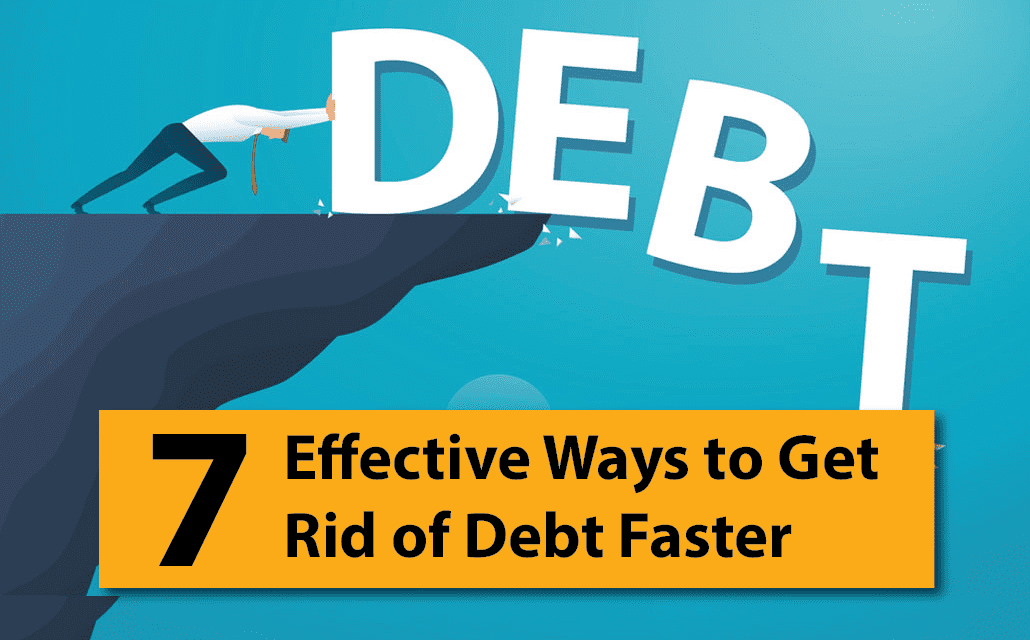In today’s world, most of us are in debts. Paying off debts such as credit cards, mortgages and any types of loans can be difficult and lead to financial stress if we don’t have the right plan or strategies. Although paying the debts may take many years for us to completely be able to achieve debt-free status, but fortunately, there are some ways in which we can apply to help us getting out of debt faster. Hence, here are a few effective ways on how we can boost our debt payoff speed.
1. Figure out how much debt do you have

 It is crucial to identify the amount of debts that we currently have. We need to organize our debts so that it will be easier for us to find ways on how to manage them accordingly. For instance, we need to categorize which type of debt that we should give priority first. Other than that, figuring out how much debt that we have can also stop us from getting more credit cards and loans. In this way, we will be aware of the amount of debts we owe and make us realize that it’s time to pay off all our debts in the most consistent and well-organized way as possible.
It is crucial to identify the amount of debts that we currently have. We need to organize our debts so that it will be easier for us to find ways on how to manage them accordingly. For instance, we need to categorize which type of debt that we should give priority first. Other than that, figuring out how much debt that we have can also stop us from getting more credit cards and loans. In this way, we will be aware of the amount of debts we owe and make us realize that it’s time to pay off all our debts in the most consistent and well-organized way as possible.
2. Manage your spending habits

 Some people may not realize that perhaps their spending habits are the reasons why they get a lot of debts. Most of the time, it is actually our spending habits that determine or decide our daily financial decisions. Hence, if we are able to control and manage our spending habits, we will be able to start paying off all our debts properly in which this makes it a lot easier and faster.
Some people may not realize that perhaps their spending habits are the reasons why they get a lot of debts. Most of the time, it is actually our spending habits that determine or decide our daily financial decisions. Hence, if we are able to control and manage our spending habits, we will be able to start paying off all our debts properly in which this makes it a lot easier and faster.
3. Consider the debt snowball method

 We can consider using the debt snowball method if we think that we can pay more than the minimum monthly payments for our credit cards and other debts. All we have to do is allocating our finance in the smallest debts and at the same time starting the minimum payments on all our larger debts. Thus, once our smallest debts are paid off, we can start putting more money at our larger debts. This sort of “snowball effect” helps us to pay off the smaller debts first while letting us to save the largest debts for last. At the end of the day, the objective of this snowballing is to put all of our extra finance toward our debts until we’re finally debt-free.
We can consider using the debt snowball method if we think that we can pay more than the minimum monthly payments for our credit cards and other debts. All we have to do is allocating our finance in the smallest debts and at the same time starting the minimum payments on all our larger debts. Thus, once our smallest debts are paid off, we can start putting more money at our larger debts. This sort of “snowball effect” helps us to pay off the smaller debts first while letting us to save the largest debts for last. At the end of the day, the objective of this snowballing is to put all of our extra finance toward our debts until we’re finally debt-free.
4. Avoid expensive habits

 Every time we want to buy an expensive item, do ask ourselves, do we really need to spend on this classy or luxury item? Do we truly need it? In other words, do not splurge our money on unnecessary items because of trends or our bad spending habits. Ultimately, we don’t want to end up lacking of budget that we’re supposed to use for paying off our debts every month.
Every time we want to buy an expensive item, do ask ourselves, do we really need to spend on this classy or luxury item? Do we truly need it? In other words, do not splurge our money on unnecessary items because of trends or our bad spending habits. Ultimately, we don’t want to end up lacking of budget that we’re supposed to use for paying off our debts every month.
5. Get a side hustle

 We can sell our old or second-hand items and get an extra part-time job to increase our savings or extra money in order to allocate more amount for accelerating our debt payoff. Apart from that, getting a side hustle also guides us to work and aim towards achieving financial freedom.
We can sell our old or second-hand items and get an extra part-time job to increase our savings or extra money in order to allocate more amount for accelerating our debt payoff. Apart from that, getting a side hustle also guides us to work and aim towards achieving financial freedom.
6. Control your emotional spending

 The trick to control our emotional spending is that we have to prepare a shopping list before going out to shop offline and of course, we need to make sure we also apply this strategy when doing shopping online as well. This strategy helps us to track our spending and encourages us to buy only what is on the list. Another way to manage our emotional spending is finding other alternatives to shopping. Instead of overspending or spending your money hastily, we can always do exercises, try listening to music or spend a quality time by doing favorite pastimes. We can still gain happiness by doing these kinds of activities as they are cost-effective and healthy alternatives.
The trick to control our emotional spending is that we have to prepare a shopping list before going out to shop offline and of course, we need to make sure we also apply this strategy when doing shopping online as well. This strategy helps us to track our spending and encourages us to buy only what is on the list. Another way to manage our emotional spending is finding other alternatives to shopping. Instead of overspending or spending your money hastily, we can always do exercises, try listening to music or spend a quality time by doing favorite pastimes. We can still gain happiness by doing these kinds of activities as they are cost-effective and healthy alternatives.
7. Stick to your plan

 The key to actually stick to our financial plan is to keep track on our budget consistently. We need to create a budget list or a checklist in order to track our daily/monthly spending. This strategy can make us more alert once we have completed one of our financial goals. In this way, we’ll know the amount of money going out and coming in so that we can stick to the financial plan and stay focus as we pay our debts. All in all, we need to have the guts and perseverance to reduce our debts and reach our financial goals!
The key to actually stick to our financial plan is to keep track on our budget consistently. We need to create a budget list or a checklist in order to track our daily/monthly spending. This strategy can make us more alert once we have completed one of our financial goals. In this way, we’ll know the amount of money going out and coming in so that we can stick to the financial plan and stay focus as we pay our debts. All in all, we need to have the guts and perseverance to reduce our debts and reach our financial goals!

